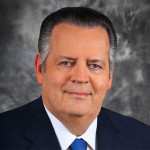A former Southern Baptist Convention agency head disputed the argument that tensions over Calvinism in the denomination are the result of traditionalists who criticize what they don’t understand.
Richard Land, former president of the SBC Ethics and Religious Liberty Commission, told the Christian Post he doesn’t buy the argument put forth in a recent interview with a millennial Calvinist student at Southern Baptist Theological Seminary in Louisville, Ky., attributing attacks on Calvinism to the fact that “traditionalists within the SBC do not understand Reformed Theology.”
“The underlying assumption there is that if we understood it, we would be Calvinists, and the fact that we’re not Calvinists is our fault because we don’t understand it,” Land, now president of Southern Evangelical Seminary in Matthews, N.C., said in telephone interview with the Christian news website launched in March 2004 where he functions as executive editor.
Land, who contributed a chapter to the 2010 book Whosoever Will: A Biblical-Theological Critique of Five-Point Calvinism, said he has read all the major Calvinist theologies and confessions of faith. “I understand Calvinism,” he said. “I just don’t think it’s right.”
Simmering tensions over what some say is a disproportionate Calvinist influence in the nation’s second-largest faith group behind Roman Catholics came to a boil Nov. 29 when a chapel speaker at Southwestern Baptist Theological Seminary in Fort Worth, Texas, called Calvinism a “Trojan Horse” leading away from Southern Baptist beliefs toward Presbyterian theology.
After a small group of students walked out in protest, seminary president Paige Patterson advised: “I know there are a fair number of you who think you are a Calvinist, but understand there is a denomination which represents that view. It’s called Presbyterian.”
Patterson, a co-founder of the so-called Conservative Resurgence of the late 20th century, said he has great respect for Reformed Christian brothers and honors their position, “but if I held that position I would become a Presbyterian.”
Patterson later said he was not asking anyone to leave the SBC but speaking only for himself about what he would do if he were in a similar position. He admitted he could have used more precise language in his off-the-cuff reaction to what he considered to be rude behavior on the part of students who walked out of the service.
Land said differences over Calvinism have been around in Southern Baptist life since the revivalist influence of the so-called Sandy Creek tradition and the distinctly Calvinist Charleston or Regular Baptist tradition came together to form the Southern Baptist Convention in 1845.
Land said he doesn’t think Baptists need to divide over Calvinism, but healing the rift will require “an acceptance by the Calvinists that the traditionalists are not going away and they are not going to accept minority status in Southern Baptist life.”
“As long as Calvinists are willing to live with diversity on this issue, then there is no reason Southern Baptists can’t continue to flourish, and flourish in unity,” he said. “But they will have to accept that diversity, and they will have to quit implying that people who aren’t Calvinists aren’t quite right.”
“As long as Calvinists are willing to live with diversity on this issue, then there is no reason Southern Baptists can’t continue to flourish, and flourish in unity,” he said. “But they will have to accept that diversity, and they will have to quit implying that people who aren’t Calvinists aren’t quite right.”
Land said he doesn’t consider the Calvinist/traditionalist debate to rise to the same level as the inerrancy controversy that led to schism in the 1980s and 1990s.
“The issue being debated here between Calvinists and traditionalists is ‘What does the Bible say?’” he said. “That’s a very different issue than the one we had in the ‘70s over inerrancy, which was ‘What is the Bible?’”
“We agree with our Calvinist brothers that the Bible is the inerrant, infallible Word of God and has truth without any mixture of error for its matter,” Land said. “That gives us a solid foundation to build Christian unity upon that we never can with the moderates and the liberals.”
Rick Patrick, the chapel speaker whose sermon set off the most recent debate, said recently in the Alabama Baptist that Southern Baptists “need some frank conversations” about how traditionalists and Calvinists can peacefully co-exist.
Patrick, pastor of First Baptist Church in Sylacauga, Ala., said the abundant resources and ministry initiatives available to Calvinists “are like square pegs in round holes” when applied in thousands of Southern Baptist churches ministering in a more traditional mode.
Patrick said the balance of power between Calvinist and non-Calvinists is markedly different at the national level than in Baptist state conventions and local associations. “Over the past decade, the leaders we have chosen as our entity heads, speakers and authors have been much more Calvinistic than the average Southern Baptist,” Patrick said in a post republished by the blog SBC Today.
Previous story:



